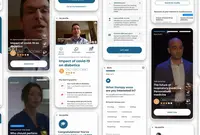- Audience Understanding
- Usability Testing
- UX and UI Design
Optimising the HCP portal registration process to improve access to valuable content

Outcomes
- Gained insights on HCPs preferences and market nuances to inform future decision-making
- Identified high-impact areas for improvements to the portal registration journey
- Evidence-based design and development for shared confidence and maximum ROI
First impressions matter: Ensuring a seamless first interaction with the HCP portal
The registration process is a crucial aspect of the user journey. As the first interaction with the digital product, it offers a chance to make a positive impression with an intuitive, simple and smooth process. Getting it right reassures users the portal itself will offer the same high standard of user experience.
Working with Astellas, we set out to optimise the registration process for their HCPs, ultimately enabling more people to successfully sign up to the portal and access valuable content and features without needing to request support.
- 1 Increase the number of HCPs that were able to complete the registration successfully
- 2 Reduce the number of HCPs that abandon the process without completion
- 3 Understand HCP feedback around the broader portal experience and identify opportunities to add value
First-hand user research with HCPs across key markets
After an internal kick-off phase involving stakeholder input, knowledge building, and understanding of the client’s wider context, we created a customised plan for the user research process.
We designed a whitelabelled (non-branded) prototype that took users through the registration process as if they were signing up to the portal for the first time — meaning there would be no bias from users in terms of previous conceptions of the client brand, and simplifying the regulatory sign-off process.
We recruited HCP participants from across 4 key markets, then conducted usability testing and interview sessions to gain in-depth insight about how easily they could navigate the process, identifying pain points and opportunities along the way. The prototype process allowed us to replicate in detail the steps HCPs would take in — from receiving the initial invite email, to gaining access to the portal content after successfully registration.

The importance of accounting for market differences
When designing digital products for international audiences, it’s important to recognise regional nuances and preferences.
If you have an international customer base, a one-size fits all approach isn’t appropriate — it’s crucial to seek feedback from all of them, or from a representative sample based on common market characteristics. There will be common views, but also distinct differences between the markets based on local legislation and user preferences.
In Germany, for example, there is already a very dominant tool for HCP registration that can be used to seamlessly verify their professional status and sign in to websites that implement this.
New insights enabled simplified user journey for HCPs
Our research helped identify a simplified user journey for HCPs registering on the portal, and provided valuable feedback on the performance of their current registration journey.
Conducting this research has allowed us to move forward into an evidence-based design phase with clear priorities and actions. The insights we’ve gained into the preferences of the HCPs across key markets will also be used to inform future iterations, including thoughts on the overall value of the portal and how it could best serve HCPs.
Obtaining first-hand research at an early stage helped validate the problem area and achieve buy-in from internal stakeholders around the subsequent design and development phases.


